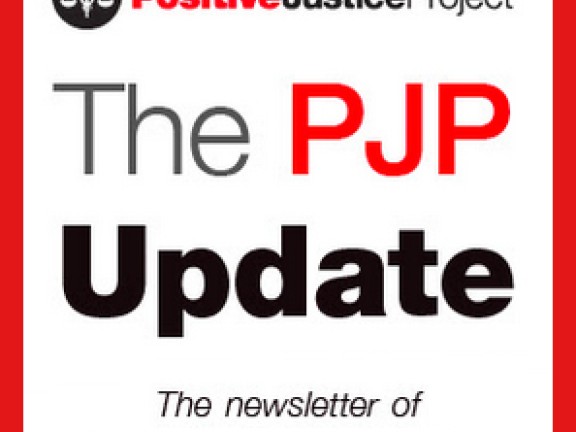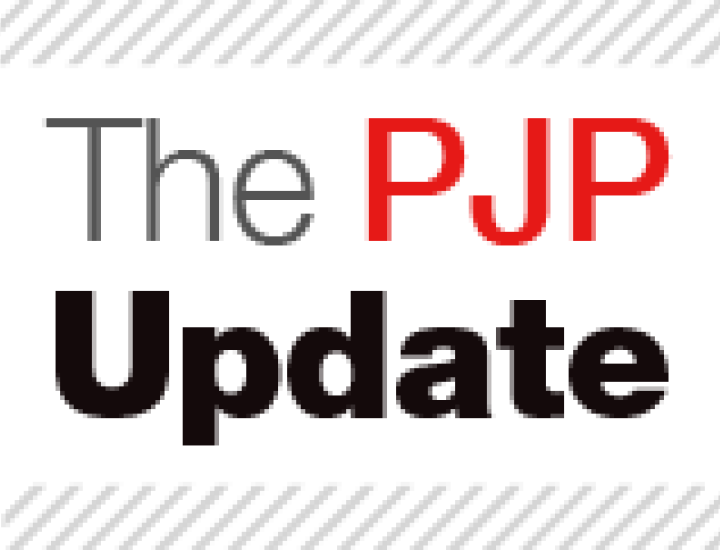Published September, 2015
The PJP Update - September 2015


Increase in Attention to HIV Criminalization Yields ResultsThe increasing investment in HIV criminal justice work[1] has produced visible engagement of LGBT organizations in HIV criminalization and other misuses of the criminal justice system based on identity and disability-based bias. [1] The Center for HIV Law and Policy’s work on criminal justice issues, particularly the ongoing work of the Positive Justice Project, is possible thanks to support from the Elton John AIDS Foundation, the MAC AIDS Fund, the Ford Foundation, Broadway Cares-Equity Fights, the John M. Lloyd Foundation, and Gilead. Advocates Across the Country Demand More Action on HIV Ignorance and the Over-Criminalized in the NHAS 2020 Federal Action Plan
(b) Lead Agency Action Plans. Within 100 days of the date of this order, the head of each lead agency shall submit a report to ONAP and OMB on the agency's action plan for implementing the Updated Strategy. The plans shall assign responsibilities to agency officials, designate reporting structures for actions identified in the Federal Action Plan, and identify other appropriate actions to advance the Updated Strategy. The plans shall also include steps to strengthen coordination in planning, budgeting for, and evaluating domestic HIV/AIDS programs within and across agencies. Lead agencies are encouraged to consider, and reflect in their plans, steps to streamline grantee reporting requirements and funding announcements related to HIV/AIDS programs and activities.
The Prosecutor, the Survivor, the State Health Agency Representative and the Lawyer: Congressional Briefing on The REPEAL Act and HIV Criminalization
Left: Michael Kaplan, ED of AIDS United, one of the co-sponsors of the Congressional Briefing on the REPEAL Act and HIV Criminalization. Right: Daniel Kirk (standing) explains how information changes minds, and why he supports the PJP Guiding Principles for reform, with (seated, left to right) Robert Suttle, Terrance Moore and Catherine Hanssens.
PJP Steering Committee Releases Principles for HIV Criminal Law Reform
State Advocacy Working Group Updates
CALIFORNIA
COLORADO
Next Meeting: September 29, 2015 6-8PM Mountain Time.
GEORGIA
Upcoming Events/Meetings/Forums:
MISSOURI
RHODE ISLAND
TENNESSEE
Upcoming Events/Meetings/Forums:
TEXAS
CHLP assists criminal defense attorneys in HIV exposure/transmission cases. We are providing back-up help, from identifying experts to drafting amicus briefs, in cases in Missouri, Florida, Indiana, New York, Ohio and Oklahoma. Among the cases we currently are involved in are the Michael Johnson and Nushawn Williams cases in Missouri and New York. [1] To read the text of the Missouri Law under which Mr. Johnson was convicted, see Ending and Defending Against HIV Criminalization: State and Federal Laws and Prosecutions, The Center for HIV Law and Policy (Updated May 2015). The manual includes the complete text of every U.S. state and territory’s HIV criminal law, with examples of prosecutions under those laws. 
Accurate Information = Power!For free access to legal, scientific and policy resources to increase your advocacy power, search the HIV Policy Resource Bank, an annotated collection of fact sheets, court cases, scientific research reports, legal and medical guides, pleadings and briefs, policy analyses and recommendations, and other materials to inform and boost your work.
|
Copyright Information: CHLP encourages the broad use and sharing of resources. Please credit CHLP when using these materials or their content. and do not alter, adapt or present as your work without prior permission from CHLP.
Legal Disclaimer: CHLP makes an effort to ensure legal information is correct and current, but the law is regularly changing, and the accuracy of the information provided cannot be guaranteed. The legal information in a given resource may not be applicable to all situations and is not—and should not be relied upon—as a substitute for legal advice.




 ALABAMA
ALABAMA








 Guiding Principles for Eliminating Disease-specific Criminal Laws
Guiding Principles for Eliminating Disease-specific Criminal Laws